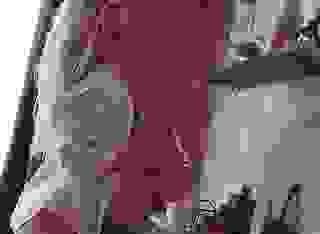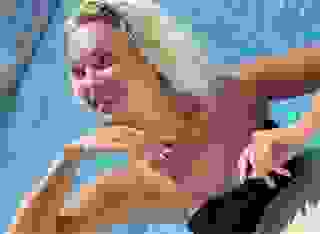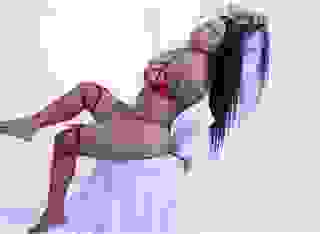Note: You can change font size, font face, and turn on dark mode by clicking the "A" icon tab in the Story Info Box.
You can temporarily switch back to a Classic Literotica® experience during our ongoing public Beta testing. Please consider leaving feedback on issues you experience or suggest improvements.
Click hereHe was following her along that trail, but then again, hadn't he always been following her? Her gait was still as strong and as steady as it ever had been, yet he could -- feel -- something different in the air apparent, something of her tremor lingering in the mist around the trail. He watched the placement of her trekking polls, watched her boots sliding in the ooze as a particularly heavy wave slammed into the rocks below -- then he pulled up short as she stopped just ahead.
She turned and looked at him. "Can you feel it?"
"The storm? Yes, I think so."
"What else are you feeling?"
"I'm wondering when you're going to tell me why you asked me to come?"
"Are you going to marry her?"
"Of course. Why wouldn't I?"
She turned and resumed walking, picking her way with great care now. Parts of the trail had recently washed away, leaving little chasms to be crossed, slate gray troughs lined with gravel and rock, little rivulets of clear water running back to the waiting embrace of the sea.
After several minutes more of this they came to a rocky outcrop; it first appeared to him as a great creature in the mist, almost like a huge preening falcon that has been sunning itself on the cliff, waiting to leave the safety of the rocks, perhaps to soar once again on hidden currents above these hidden seas. Then it hit home -- his mother was the falconer, and she always has been. That's why she had brought him here. She is going to let slip the falcon's hood -- so that perhaps he can see the way ahead is not without danger.
But now she pulls off her little backpack and sits on another sun-drenched rock, pulling out sandwiches and bottles of cold, still water.
"Aki's father has Huntington's, Jere." She speaks the words calmly, her delivery practiced, her manner still quietly a matter of fact, like the falconer's wrist is offered, as always, as neutral ground. She is safe. Isn't she?
He swallows hard, tries to take a deep breath but his throat feels constricted. "Huntington's Chorea?" he manages to say. "Is he symptomatic?"
She nods. "Yes. Just." Her voice is clear of the tremor now, the falconer's strength is regained.
"Oh, Mom," the dutiful falcon says, the vice around his chest constricting tightly, rockbound in anguish as yet another secret falls away, "I'm so sorry. I had no idea."
"And neither does Aki, Jere. He's wants to keep it that way, too, though I think now he understands how unfair that is of him."
"Doesn't it skip a generation? I mean...is it a certainty that Aki will inherit?"
His mother turned away from the sea, looked away from the shadow of his doubt and then cast it aside with an errant shrug. "There's no...no one, Jere...nothing really definitive when such things are brought up. Everything seems so very circumstantial. And, well, I'm sorry to say, but I rather think the odds are she too will be affected."
"Mother," says the voice with the tremor now all his own, "Aki is pregnant."
"How pregnant?" asks the falconer.
Five months, it turned out, so far too along to even consider the usual alternatives. But then...the hammer blow, the reason for his sudden trip: "Jere. You mustn't tell her."
"What? Mother? How could either of you ask such a thing?"
"Because it is still her father's wish. Please don't put me in that position, Jere..."
"What? Just what, exactly, is the position you will be in?"
She had looked out over the sea after that, only taking time to finish her sandwich -- before the falcon cried out in pain again, still waiting for release.
Chapter Seven
Seattle | Today
Akari is in radiology. Today is her MRI.
He has asked to speak with her oncologist, Dr. Andrews, in his office. The physician seems slightly put out by this intrusion but is otherwise observant and attentive, in that oblique way physicians sometimes have around relatives and the great unwashed they must so often endure. The physician's eyes are red, his eyeglasses quiet and thick, but he smells of expensive cologne and too much red wine at lunch.
"So...Mr. Grey? Patrick Grey, you said? Say, are you the writer?"
Fontaine/Grey shrugged. "I am Akari's father."
The physician nodded before a sated yawn appeared. "So, what can I do for you?"
"Akari's grandfather and mother passed from Huntington's Chorea. She doesn't know that. In the rather unlikely event you stumble upon markers for that disease, assuming you sequence her genes at some point, you will not tell her anything concerning this -- should the subject arise. And I just wanted to be clear about that."
And it soon became apparent that Dr. Andrews didn't care for being told what he could and could not tell a patient in his care. His face turned scarlet, he sputtered words like 'paternalistic crap' and 'disgraceful' and peppered them with spit-covered and rather abusive epithets that sounded an awful lot like four letter words -- before finishing up with a couple of spicy 'How dare yous!' thrown in for good measure.
"And I suppose you learned about gene sequencing on YouTube?" Andrews snarled as he stood and pointed to the door. "You! Out! Now!"
But the old spy ignored the physician.
"Get out of my office!" Andrews thundered once again. "Now!"
So the old spy simply extended his right hand.
And the physician ignored the spy's hand, still pointing at the door to his office.
And so then the spy spoke.
"Thank you for your time," Fontaine/Grey said as he made to leave.
But there was something in the spy's eyes that gave the physician a moment of pause. Something akin to flashing red lights and blaring klaxons.
"Tell me something, Mr. Grey. Are you the writer of those spy stories?"
The spy looked at the physician, his eyes now brooding and dark. "They aren't stories, Doctor. They are more like...recollections...of events," he said, his voice low and clear, and perhaps even a little menacing, "though of course some events had to be cleared by the agencies involved."
"I see. I enjoyed the last one very much. Did you study chemistry?"
"I did, yes," the spy said, his voice now -- like his eyes -- slipping into façades still too readily deployed.
"Akari's mother, I assume, was a carrier?"
"She was, yes."
"I'm so sorry. Was it her wish that you not tell Akari?"
The pain is as inescapable now as it ever was on that day. Yet even now, so caught up is he in the suffocating web of secrecy that has defined his life, the falcon still cannot fly. He can only nod before he turns and leaves the room.
Chapter Eight
Palo Alto | Yesterday
Akari is nursing contentedly on her mother's breast; a soft, warm breeze caressing mother and daughter through open windows, a soft lullaby of redwood and eucalyptus drifting slowly through another lavender afternoon. Aki is asleep, lost in dreams of Cambridge, of the long walks she used to take beside the river. Maybe it's the lacework of lavender on the arbor, or the gentle way of the sun-kissed warmth carried on the languid breezes, but these dreams feel so real to her, so real she wants to reach out and hold on to each new lucid moment before they fade away in wakefulness.
Jeremy is 'at work,' at Stanford, or whatever that means. He is supposed to be working in a doctoral program there, yet it is, apparently, a program people around campus don't talk about. It is, she heard once, a Dark Program, a course of study concerning Very Dark Things. She suspects he is working on some kind of biological warfare project, yet she just isn't sure, not really. And though the possible nature of his work bothers her, it is the careless evasions he hurls indiscriminately that hurt the most.
He seems to live in a world of secrets, where lies and deceit are intertwining strands of the sacred rituals he lives by. When she asks what he's working on at school he mumbles and shrugs as he helps get dinner ready, muttering incoherently about recombinant this and bivalent that and in the end he really doesn't make a whole lot of sense. And yet that lack of meaning feels deliberate, and thoughtlessly so, as evasions tend to be. Because she has driven him to campus, usually to the Gilbert Building but more often to the Beckman Center facility at the Medical School, and she has seen other teachers and students there greet him knowingly, so at least she knows he isn't lying to her -- about working there, anyway. But even so -- the feeling persists: there is something inherently wrong, almost evil, in his evasions.
And now her father has grown silent. He used to call every Saturday morning, but not recently. She has taken to calling him instead, yet Claire always answers the phone -- and she wonders why this is so. "He is napping," Claire says. Or: "He is out on the golf course." And now her father is always just beyond her reach, and she is grasping for reasons, reaching out in the darkness, her hands enmeshed in more spiders' webs. Why has he turned away? From her. From his granddaughter? Why? Always--why?
And then the call she has been waiting for comes just as Akari finishes feeding at her mother's breast. The telephone is close by so she doesn't even have to disturb her daughter, and then in an instant her father is on the line. He is coming to San Francisco later that week. He would like to see her, and of course he wants to spend time with his granddaughter.
Aki is ecstatic. It is as if her dreams are coming to life, and all Jeremy's evasions are summarily forgotten, discarded, thrown out with yesterday's trash. In a manic race against time she sets about cleaning their little bungalow, sprucing up the garden and the backyard where Akari and her grandfather will play.
Jeremy takes note of the change as soon as he gets in from school. Suddenly surrounded by her boundless energy, at first he is amused by the change that has come over Aki. But then the ragged contours of mania, of another manic episode, take shape in the rooms around the little house. He gropes in the dark for explanations, paying no mind at all to his own role in the looming collision; all he sees is his wife -- coming undone in the grips of another unexpected hysteria.
His first impulse has been to regard these manic tirades as some sort of hormonal thing -- "because she is, after all, female." But no, that isn't quite right, nor is it fair -- because he knows how invested she is in all her father's comings and goings. This feels, to him, more like a fault slipping deep within the earth, unseen and barely remembered until the plates let go -- in that first surreal moment when the rolling tremor begins. But then the inherent dichotomies of his own life take charge and he falls into the search for a mystical explanation rooted in thoughts of karma: he is soon left to consider that this outburst might be an awakening of the ancestral spirits that surround her. And if this is so, have these spirits come to guide her, or to warn him?
Chapter Nine
Seattle | Today
Akari is standing on the deck -- alone with her thoughts. With her fears.
The spy is in his wheelchair. In his white living room, with a small fire set on iron grates now a fading glow above bricks blackened by time. He is watching Akari, thinking about the little bungalow in Palo Alto and the life together that almost was. Before their life turned to silence and everything fell into the sea. Yet even now his thoughts roam through time to those last precious moments together. To Aki, his wife. Akari's mother. To all the things that vanished in the heat of sudden release.
Akari had, like her mother, grown up away from Japan, yet never was she fully removed from Japanese life and customs. Indeed, she always carried little pieces of Japan with her everywhere she went. Rocks large and small, but always either black rocks or white, and always from the sea beneath her grandfather's houses. Pinecones and pine-needles too, yet only from the forests around her family's ancient estate. And an arrow, at least for a while, that had once been split by another incoming arrow. But that was a secret she never talked about.
And that secret, like all the rest, began to unravel one day in Palo Alto. The day her grandfather came to visit. The last time, as it happened.
But the spy's mind snapped back to the present, to Akari standing on the pier, staring into the water. He watched her watching the sea, unsure in that moment where her mind roamed. Would the otter come, he wondered? Could Akari possibly understand something so obvious?
Try as she might, Carolyn had not once seen the otter -- despite many attempts. She had heard of Patrick's encounters with the creature often enough; word of these strange communions was common knowledge down here along the water by the locks. Patrick's house, despite all his intentions to the contrary, had become a very public place -- no secrets allowed. Boats, from yachts to fishing trawlers coming in after weeks at sea, passed by the striking gray house, the one with the old man in his wheelchair often seen out on the tidy little private pier. Because not long after the old man moved into the gray house an otter appeared, and now it seemed that the little creature came to the old man almost every evening, and that, from a distance, it appeared as if the otter and the man in the wheelchair were speaking to one another. Soon enough photos of the encounters popped up on Instagram and Facebook, and some weekend evenings small crowds of boats gathered in the waters off the striking gray house and the gathered people waited to see what would happen.
And there were nights the old spy rolled down the pier right to the water's edge and he waited there for the otter, seemingly willing her to appear. Yet there were evenings, usually when the largest crowds appeared, when she never came to him. And then the people saw that the old man was worried -- even as all the disappointed boaters went back through the locks to Lake Union.
Yet then, but only after all the noisome crowds dissipated, she came to him. And those who watched from a distance began to understand.
Yet after more than a year of hearing about all this, Carolyn had still not seen even one of these encounters. Like everyone else she wondered what they were all about, but like all the rest she found herself caught up in the deeper mysteries surrounding these encounters. She began to search for something that might explain the man, the creature, and the Spirit Gardens around the strange gray house. But once she started down that path the next most obvious question came to her quite naturally: what was the relationship between the statues in Patrick's little gardens and this otter?
Because for some reason Carolyn was sure there was a connection, and an important one at that.
"Why are such statues placed in these little gardens?" she asked him once, after she'd returned him from another doctor's appointment.
"They are homes, homes for the spirits that follow me from time to time," he explained.
"What?" she barked, suddenly thinking her best-selling author might just be a nut case.
"In Shinto, spirits roam both the heavens and the earth, yet when they are here among us they need places to stay."
"Spirits? You mean...like ghosts?"
The spy smiled. "Not always, but then again, yes, a kami might reside in the spirit world, for a time. But it is important to remember that kami are like us in many ways; they are not simply good or evil -- they are often a little bit of both. Precocious, you could say. Even more difficult to grasp, these spirits are not separate from the natural world, but they are, rather, of that world. A kami, or what you call a spirit, might not reside in a rock -- rather than simply be of the rock. So kami will not, in that sense, be like a breeze, rather they are quite literally the breeze, so when you look at one of my little gardens focus on what your eye is led to, then let your thoughts stay there for a while. Focus. Drift inward. It is said that in time, when your thoughts become one with the kami, that you can watch a rock grow, or see the breeze as it moves through its sky."
"So, you're saying that these spirits, these kami...they live...in your gardens...?"
"Not exactly, Carolyn. It is a more direct relationship than that. The garden, or I should say the individual elements within the garden, like that rock by the lantern, may be kami. The garden is simply a part of their journey, perhaps a place of rest along their way. Of more importance, these gardens are a place to reflect on my own journey."
She looked at him carefully now, unsure how to proceed before deciding to go for broke. "So, tell me about the otter?"
"Tell you what, exactly, Carolyn?" the spy replied.
"Is this otter, well, some kind of kami?"
But the spy relaxed just a bit, then he smiled -- even as he shrugged -- and a little playfully, too, or so she remembered thinking at the time. "Sometimes, Carolyn," he finally sighed, "an otter is just an otter."
And yet there are times when everything falls apart, even the idea of kami, under the weight of just one more secret. Some call this bad karma, though it must be said that this is usually whispered with a gently knowing smile.
Chapter Ten
Palo Alto | Yesterday
Aki had been scrubbing the bungalow, making the old house ready for her father's visit. Jere had mown the grass twice this week, and he dropped a sack of nitrogen rich fertilizer on the lawn two days before D-Day, watering everything until the grass looks like it belonged on a travel poster extolling the virtues of Irish dairy products. There wasn't a single weed to be found in any one of the half dozen flower beds around the pristine little yard, and he'd even touched up some peeling paint on the garage door. The place, he thought, was spotless -- so clean it might easily pass a cadet inspection at Sandhurst.
A black limousine pulled up out front and a driver exited and removed a wheelchair from the Cadillac's boot, and now Aki stands quite still, almost like an English Setter on point. She watched as Claire helped her father from the back seat, and she was mortified when she realized her father could hardly stand on his own. Claire wheeled Kaito-san to the front porch, but there were four steps here and no ramp for Kaito-san's wheelchair. He stood and Jere helped him up the stairs, and Jere could see now with his own eyes Kaito-san's rapid decline, and he was stunned speechless. Once Akari's grandfather was wheeled into the living room the little girl turned away from the sight of the crippled old man, and everyone in the room was devastated -- Aki most of all.
Though everyone there is fluent in Japanese, English is the chosen language, yet one moment Kaito-san can hardly speak coherently, then he speaks clearly -- until his head jerks sideways and his eyes roll upwards. He reaches for Claire's hand, obviously an agreed upon signal that she will break the news and lead all further discussion.
"Aki," Claire began, "your father loves you. He wants you to know that now, and he wants you to remember that in the years ahead."
But Aki is a biochemist. She teaches biochemistry. She understands the chemistry of neurodegenerative disorders, and even the classifications of such disorders, so when she observes her fathers rolling shoulder movements and his twitching hands she understands what has befallen him.
"How far along is he, symptomatically?" she asked, her voice a cool, gray monotone.
"More than a year," Claire said.
Aki turns to her father. "How long have you known?" she asked him.
"He's known all his life," Claire stated.
Aki turned to her husband. The spy. The expert at keeping secrets. "And how long have you known?"
But the spy turned away from her words and walked from the room.
"I see," Aki says, her mind taking flight in this suddenly altered reality.








